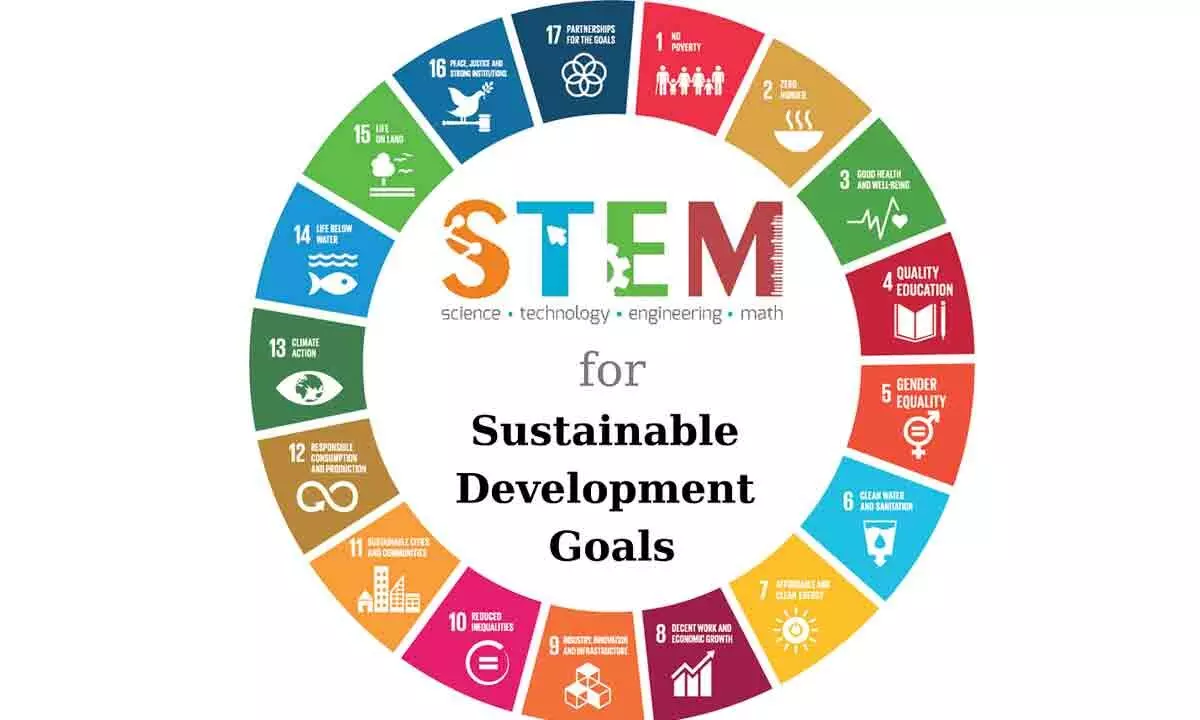How STEM education helps in improving cognitive development

STEM education, which focuses on Science, Technology, Engineering, and Mathematics, is an interdisciplinary approach to learning that integrates these four core subjects to provide students with an all round and practical education and thus plays a fundamental role in cognitive development.
STEM education, which focuses on Science, Technology, Engineering, and Mathematics, is an interdisciplinary approach to learning that integrates these four core subjects to provide students with an all round and practical education and thus plays a fundamental role in cognitive development.
Since STEM education focuses on real-world applications, problem-solving, critical thinking, and hands-on learning experiences, it helps in preparing students for careers in science, technology, engineering, and mathematics-related fields.
The contribution of STEM in honing the practical skills of students can not be understated but apart from this, STEM incredibly contributes in raising IQ as well.
IQ, or intellectual quotient, measures an individual's cognitive ability and potential. It is generally assessed through standardised tests that evaluate a person's ability to think, reason, and solve problems. A high IQ is often linked with greater cognitive capabilities and the potential for success in various aspects of life, including academic and professional achievements.
STEM education has the potential to improve IQ in several ways. STEM courses enhance cognitive abilities by engaging students in critical thinking, problem-solving, creative exploration, and analytical reasoning.
This article will shed light on how STEM education can enhance IQ by improving critical thinking, fostering creativity, building analytical capacity, and developing resilience and perseverance.
STEM education and cognitive development
Here's how STEM education helps in improving cognitive development:
1. Improving critical thinking
STEM courses encourage critical thinking and deliberate reasoning. By tackling complex problems and conducting experiments, students develop the ability to analyse information practically and draw informed conclusions. For instance, in a physics class, when students are made to analyse real-world scenarios to understand the laws of motion, this promotes logical reasoning, a key component of high IQ.
2. Building originality
STEM fields require creative problem-solving skills because they are full of novel challenges that demand original solutions. This fosters a mindset of creative thinking and coming up with innovative ideas. For instance, an out of the box thinking is required to design a new type of technical device or develop sustainable energy solutions. Such logical and creative thinking contributes to raising IQ levels.
3. Building analytical capacity
STEM is a field which requires the ability to break down complex problems into manageable components and develop systematic solutions. This analytical approach is a necessity not only in STEM but also in various life situations, enhancing cognitive abilities, especially considering the fact that STEM occupations will significantly rise in future. According to utep.edu, STEM occupations will increase 10.5%. by 2030.
4. Developing resilience and perseverance
In STEM education, students face complex concepts and difficult problem-solving tasks, requiring perseverance and resilience to overcome. Learning from failures and persisting through downfalls is a valuable aspect of STEM education. These experiences build character, teach students to persevere in the times of adversity, and ultimately contribute to their intellectual growth.
Obstacles
STEM education indeed has numerous benefits, but there are potential drawbacks and limitations to using it as the primary means to raise IQ. One significant challenge is the risk of a one-sided education that neglects other essential areas of knowledge. An all round education that includes the arts, humanities, and social sciences is necessary for the holistic development of students.
The impact on efficiency
STEM education not only enhances IQ but also has a significant impact on an individual's efficiency, both in education and in the workplace. Higher IQ often leads to better academic performance, as students are well skilled to grasp and apply complex concepts. In the professional world, STEM-educated individuals are in high demand because of their problem-solving skills, analytical thinking, and creative problem-solving abilities.
Furthermore, people with improved cognitive abilities can contribute to advancements in science and technology. Innovations in these fields are often the result of individuals who can think critically, creatively, and analytically. This progress benefits society as a whole, leading to innovation, economic growth, and improved quality of life.
STEM education plays a pivotal role in raising IQ by improving critical thinking, fostering creativity, building analytical capacity, and developing resilience and perseverance. These skills not only result in higher IQ levels but also enhance efficiency in academic and professional areas. These skills become more important because STEM occupations are on the path of growth. According to the US Bureau of Labor Statistics, occupations in STEM fields are projected to grow by 8 percent by 2029, compared with 3.7 percent for all occupations.
As we continue to advance in this dynamic landscape, investing in STEM education is a critical step toward a progressive future.
(The author is Director, India STEM Foundation)

















